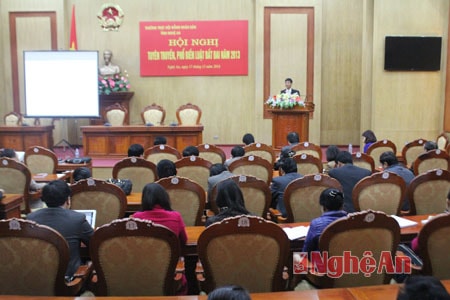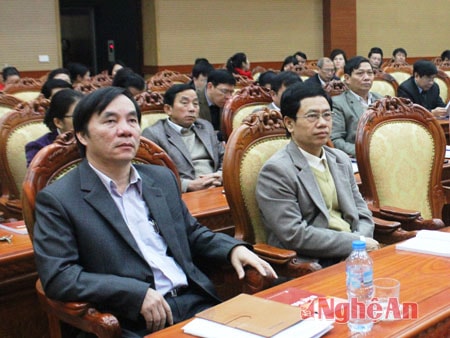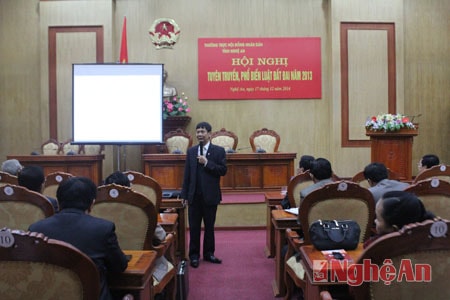Conference on propaganda and dissemination of the 2013 Land Law
(Baonghean.vn) - On the morning of December 17, the Standing Committee of the Provincial People's Council held a conference to disseminate and popularize the 2013 Land Law. Attending were representatives of the Standing Committee of the Provincial People's Council; districts, cities and leaders of relevant departments and branches.
Mr. Bui Sy Dung, Deputy Director, Department of Legal Policy, General Department of Land Administration (Ministry of Natural Resources and Environment) chaired the conference. Attending the conference were comrade Nguyen Xuan Son, member of the Provincial Party Committee, Vice Chairman of the Provincial People's Council.
 |
| Overview of the conference |
 |
| Delegates attending the conference |
Land Law No. 45/2013/QH13 of the National Assembly of the Socialist Republic of Vietnam passed on November 29, 2013. The 2013 Land Law stipulates the land ownership regime, the powers and responsibilities of the State representing the entire people's ownership of land and uniformly managing land, the land management and use regime, land use rights and obligations with respect to land in the territory of the Socialist Republic of Vietnam. The 2013 Land Law has 212 articles and 14 chapters, an increase of 7 chapters and 66 articles compared to the 2003 Land Law, effective from July 1, 2014.
 |
| Mr. Bui Sy Dung, Deputy Director, Department of Legal Policy, General Department of Land Administration (Ministry of Natural Resources and Environment) disseminated new points of the 2013 Land Law. |
At the conference, Mr. Bui Sy Dung, Deputy Director of the Legal Policy Department, General Department of Land Management (Ministry of Natural Resources and Environment) introduced and analyzed to delegates the new points of the 2013 Land Law. Compared with the 2003 Land Law, the 2013 Land Law has 9 important innovations. Specifically, it clearly stipulates the rights, responsibilities and obligations of the State in land management; perfects land law policies for agricultural and rural areas such as ensuring food security and environmental protection; pays attention to land quality, innovates planning and land use plans to meet land management requirements; strengthens the operation of land relations according to market mechanisms, moving towards eliminating subsidies in land management and use; perfects the mechanism for promoting land resources through regulations on the State proactively reclaiming land according to land use plans, establishing a Land Development Fund...
Pham Bang






